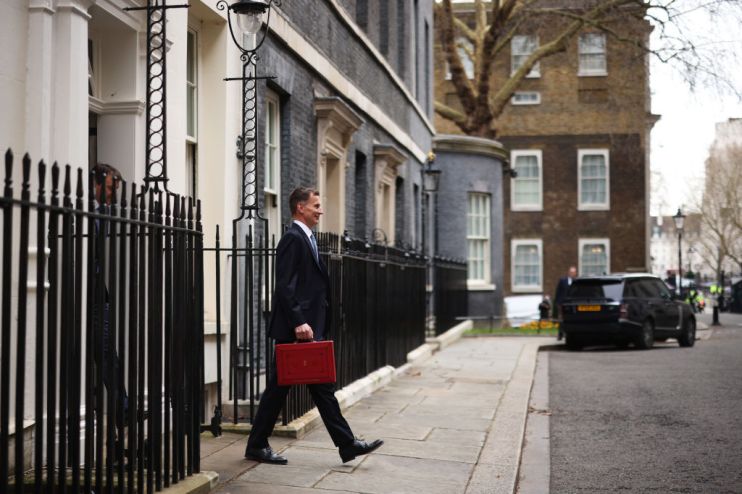Spring Budget 2024: Six things to look out for

This year’s budget is expected to be even more political than usual: but what do we know will be in it?
A string of rumours about tax cuts briefed to the weekend’s newspapers? Check. Continual complaining about the government’s fiscal rules? Check. Unrealistic spending commitments? Check.
It could only be another Budget.
We’ve gone through the essential things you need to know before tomorrow’s fiscal event.
Tax cuts
One thing is certain in the Spring Budget: Hunt will cut taxes. We do not know exactly what taxes he will cut or by how much, but with the Conservatives trailing Labour by as much as 20 percentage points, tax cuts are guaranteed.
The latest reports suggest the Chancellor will focus his attention on National Insurance rather than cutting income tax. This would follow the 2p cut to the levy he announced last Autumn.
A further one percentage point reduction to National Insurance would see £4.7bn returned to taxpayers, according to Capital Economics. Hunt would likely claim it delivers on his promise to boost growth as the cut would encourage more people into the workforce.
Fuel Duty
The other near certainty is that Hunt will extend the freeze on fuel duty. As the name implies, fuel duties are levied when consumers buy fuel.
The headline rate is 52.95p per litre, reflecting a ‘temporary’ 5p cut introduced in 2022. The OBR says the tax is a “significant source of revenue” for the government.
Stated government policy is for fuel duty to rise in line with RPI inflation and for the temporary 5p cut to be reversed, but there’s little chance this will happen. Why? Fuel duty has been frozen for 13 consecutive years and Hunt has not given any indication this will change.
Maintaining the freeze and the ‘temporary’ cut would leave another £6.5bn in drivers’ pockets, according to Capital Economics.
Vaping tax
A cut to National Insurance and freezing fuel duty does not leave Hunt with much extra fiscal room. Under self-imposed fiscal rules, he must get debt falling between the fourth and fifth year of the Office for Budget Responsibility’s (OBR) forecasts.
Fiscal headroom captures how much spare capacity he has to meet this target. The latest estimates suggest he will not have much more than the £13bn in November, which was already at historically low levels.
Cutting taxes makes balancing the books more difficult, and so Hunt is looking to raise funds elsewhere. A tax on vaping is one suggestion. Although vapes are subject to VAT, they do not face a separate levy like tobacco does. Treasury estimates suggest introducing a levy could raise £500m.
Non-doms
Another revenue raiser Hunt is reportedly considering is scrapping or scaling back tax perks for foreign nationals who are resident in the UK.
The regime allows non-doms to earn money from capital abroad without paying any tax for up to 15 years so long as the gains are not transferred back into the country.
ONS figures suggest there were just under 70,000 non-doms in the UK in 2022, including Rishi Sunak’s wife. Scrapping the rules could raise £3.2bn a year, according to research from the London School of Economics and the University of Warwick.
But the move would be politically difficult for Hunt. The policy is one of Labour’s most prominent tax policies and Hunt himself has previously spoken out against scrapping the regime.
Productivity
Another way of freeing up the space for tax cuts is reducing public sector spending. A number of economists think Hunt’s current spending plans are already unrealistically tight, but if the Chancellor can lift public sector productivity, then he will be able to make precious savings.
Productivity essentially measures how well workers use the resources they are given. Improving productivity allows workers to do more with less.
Although public sector productivity has flatlined since 2000, Hunt and Sunak are hopeful that AI could deliver the kind of productivity gains that previous Chancellors have only dreamt of.
The government updated its public sector productivity programme in the Autumn, with Hunt suggesting new tech could help save millions of working hours. Expect more in the Budget.
ISAs
Hunt is reportedly going to shake up the Lifetime Individual Savings Account (ISA) in an attempt to get more young people onto the property ladder.
Lifetime ISAs allow savers to put in £4,000 per year up to a limit of £450,000. Whatever an individual saves, the government adds a quarter on top. However, if money is withdrawn for any reason except buying a property, the withdrawal is subject to a 25 per cent penalty.
The lifetime ISA limit has not been raised since 2017 even as house prices have climbed rapidly, and so Hunt is likely to lift the limit from £450,000 to £500,000. He will also reduce the penalty charge on withdrawals from 25 per cent to 20 per cent.
99 per cent mortgages may also be introduced to give cash-strapped youngsters a chance of getting onto the housing ladder.